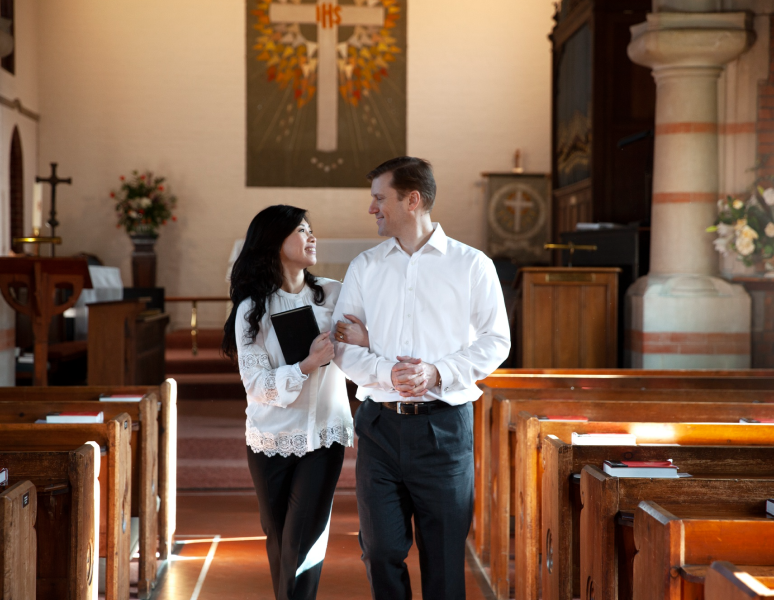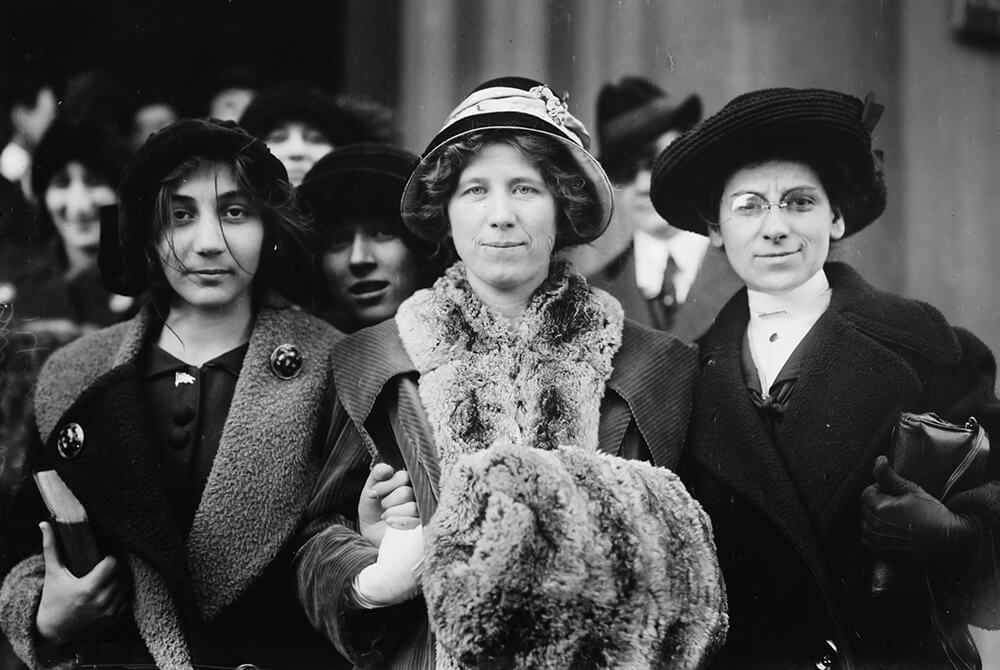
The extent of women’s involvement in church leadership varies among different congregations. Some uphold the belief that men and women are equal yet have distinct roles. These ministries offer a more supportive role for women within the church. Conversely, others believe that anyone, regardless of gender, who feels called to ministry or seminary should have the opportunity to lead others in worship. Irrespective of personal or ministry beliefs, there are always avenues for women to actively participate and contribute within the church community.
Women in Christian Leadership: A Brief History
The presence of women in leadership positions within the church has long been topic of controversy. This continues to persist in certain circles. However, there have been notable changes in recent years. When examining early texts, though, it becomes apparent that women played pivotal roles in the early stages of the religion’s development and spread.
Figures like Mary Magdalene, Susannah, and Joanna were among Jesus’ earliest supporters. Mary Magdalene was actually reported as the first person to witness His resurrection. In the early days of Christianity, women served as apostles and played crucial roles in sustaining the religion during its illegal status in the Roman Empire.
Meetings often took place in homes, which were predominantly under the domain of women during that time. These women, who assumed leadership positions in early Christianity, actively shared the teachings of Jesus and contributed to the survival of the faith during challenging times.
A Sudden Change
It was only several hundred years later that texts emerged which explicitly excluded women from official church leadership roles. These texts primarily restricted widows, who were often benefactors of the ministry, from preaching or teaching due to concerns about potential controversies.
The Church instructed them to remain at home and devote themselves to prayer. For an extended period, the prevailing belief was that women should be subservient to their husbands and should not hold positions of authority within the church.
During the Middle Ages, with the establishment of convents, more opportunities arose for women to assume leadership roles and dedicate themselves to the church. Concurrently, several influential European female royals converted to Christianity, providing a distinct form of leadership within Christian communities.
The Modern Carryover
Today, many women find roles in church leadership. Numerous Christian denominations permit the ordination of women, and even in those that do not officially recognize it, certain ministries may choose to ordain women as a statement of their beliefs. The presence of women in church leadership has become more prominent. This reflects evolving perspectives within Christian communities.
The Different Views on Women as Church Leadership
The topic of women in church leadership sparks significant debate. Some churches prohibit it completely and others embrace the inclusion of women in leadership roles. If you’re seeking to explore different experiences within this spectrum, the Pew Research Foundation has compiled a list that highlights denominations and their respective stances on women in leadership. This resource provides valuable insights into the various positions held by different religious groups regarding the involvement of women in church leadership.
The Biblical View
Within the Christian community, there are still many adherents who uphold what they perceive to be the biblical perspective on women’s roles in the church. According to this viewpoint, men and women are regarded as equal in value but different in their designated roles. Advocates of this belief assert that men should hold leadership positions within the church. However, women are encouraged to fulfill supportive roles.
It’s important to note that not all individuals who embrace these biblical teachings apply them to all aspects of life, such as home and society. The focus is often on the complementary nature of men and women. Men assume leadership roles, and women contribute by being devoted wives and tending to domestic responsibilities.
People often refer to this perspective as the complementarian view. Its foundation rests upon biblical interpretations highlighting the priority given to male leadership and the concept of female subordination.
The Egalitarian View
Those who embrace an egalitarian perspective firmly believe in the equality of men and women within the church. This carries over into the areas of marriage and society as a whole. They find biblical support for their views in passages such as Galatians 3:28. Paul emphasized here that, in Christ, there is no distinction between male and female. We are all unified.
They also point to the initial creation account in Genesis. This portrays men and women as equally valued and created by God. On the more progressive end of the egalitarian spectrum lies the feminist viewpoint. Advocates of this perspective actively challenge passages in the Bible that traditionally assign specific roles to women.
They may also hold socially liberal views that diverge from those commonly held by certain Christian circles.
Which Is Right?
Ultimately, the decision of which view is right for you regarding women in church leadership is a personal one. Only you can make this decision. There are congregations that align with both perspectives, supporting individuals with varying beliefs. If you’re unsure, it can be helpful to engage in research, study the relevant biblical passages, have conversations with diverse members of ministry leadership, and seek guidance from other Christians whom you respect. By doing so, you can find a religious community that aligns with your beliefs and stance on the involvement of women in church leadership and ministry.
Why Do Egalitarian Churches Want Women in Ministry?
Religious Beliefs
Egalitarians hold the belief that Jesus treated men and women equally, both in public and private settings. They find biblical and historical evidence to support this perspective. During Jesus’ time, women often found themselves marginalized and considered as possessions, with limited rights. However, Jesus defied societal norms by engaging with women directly and showing them warmth and respect.
In contrast to those who adhere to a traditional biblical view, egalitarians reject the notion that God cursed either men or women during the fall of humanity when Adam and Eve were tempted by the serpent. Instead, they believe that the curse was placed upon the serpent alone. Furthermore, some egalitarians argue that most modern Christians do not follow every single point of the Bible literally. They question why religion treats the issue of gender roles any differently.
For them, what truly matters is following the teachings of Christ, with gender being irrelevant in this context.
Social Beliefs
Egalitarians recognize that societal dynamics have evolved over time. They argue that women’s exclusion from certain church roles was more influenced by social factors rather than religious ones. This was particularly true in the early years. It wasn’t until several centuries after the death of Christ that official exclusion policies emerged.
Egalitarians acknowledge that deeply ingrained traditions can be difficult to overcome. However, they believe that the church should adapt to the changing times. They point out that the practice of Christianity has transformed in various ways. We now utilize social media platforms and websites to share our faith and communicate information about ministry gatherings.
We even have smartphone apps that aid in Bible study. Additionally, many Christians no longer strictly adhere to certain Old Testament dietary or clothing laws. For instance, many of us ignore rules about shellfish consumption or wearing mixed fabrics. Egalitarian ministries argue that if we can update our perspectives on these matters, it is also appropriate to reevaluate and revise other Christian views. This includes gender roles within the church.
Are There Church Roles for Women in Traditional Ministries?
So, what can you do if you hold more traditional biblical views about women in church leadership but still want to be more involved in the minstry? There are still plenty of opportunities for you to serve and contribute. This is true even if you don’t pursue a formal ministry role. Here are some ideas to consider:
Childcare
In order to cater to the needs of young children who may struggle to sit through an entire church service without becoming fussy or disruptive, many ministries offer childcare services. Whether provided by volunteers or paid staff, these individuals, often women, play a crucial role in ensuring a smooth worship experience for all attendees.
Their dedication and commitment to caring for the children create an environment where parents and guardians can fully engage in the service, knowing their little ones are well cared for.
Sunday School Roles
Churches often offer separate educational programs alongside their regular services. These programs are always in need of teachers and classroom helpers. Taking on this role allows you to actively participate in shaping the spiritual education of the children in your congregation. You can teach them about Jesus and impart Christian values. If you possess a gift for teaching or assisting teachers, this opportunity could be a wonderful fit for you to contribute and make a meaningful impact.
Adult Mentorship and Education
Are you acquainted with someone at church who is embarking on their Christian journey or has recently returned after an absence? Consider becoming their mentor, offering guidance in Bible study, and fostering their religious understanding. Your role as a mentor can significantly assist them in staying on the right path and deepening their faith. Sometimes, all it takes is a supportive friend within the church community to encourage someone’s continued engagement and attendance.
Volunteering
Ministries are constantly in need of volunteers, particularly during special events. Consider signing up to assist in any capacity required. This could involve tasks such as decorating, post-event cleanup, or warmly welcoming fellow church members at the entrance. Regardless of the specific role, your willingness to lend a hand will be a valuable service to the congregation.
Food Support
Church events often involve various food-related activities, such as bake sales and potlucks. Utilize your culinary skills to contribute a delicious treat that everyone can enjoy. Ensuring that appetites are satisfied creates a conducive environment for engaging in Bible study and worship. Simply put, an empty stomach can be a distraction. Everyone will greatly appreciate your delectable contribution.
Music
Churches often have bands or choirs where anyone can participate and praise the Lord through music. Being part of the music during services is enjoyable. And if you have a passion for singing or a willingness to learn, consider joining the choir to uplift and praise together.
Ask the Ministry Leaders
If you’re uncertain about how to contribute at church, reach out to the ministry leaders and inquire about opportunities to help. They may suggest that you make a positive impact by exemplifying a Christian lifestyle within your family. Alternatively, they may propose other ways for you to get involved within the church community based on your unique talents and abilities.
Regardless of your stance on gender equality in church leadership, there are always avenues for engagement. If you’re dissatisfied with how your current ministry handles women’s roles, consider exploring other local congregations that align more closely with your beliefs. Remember, there is no definitive answer to the question of women in church leadership.
The most important aspect is to reflect on your personal convictions and follow your own spiritual journey.


